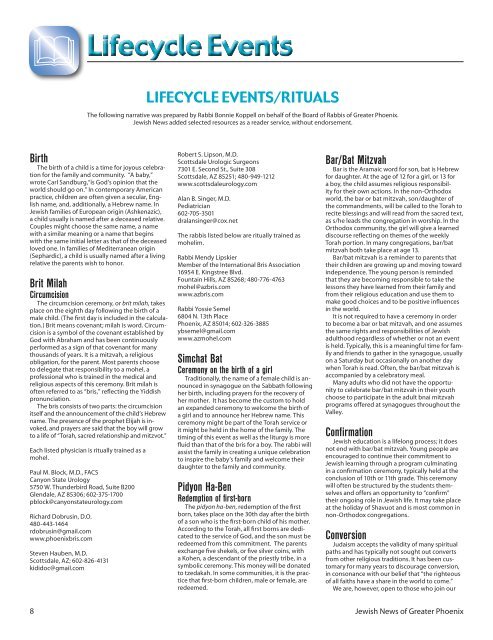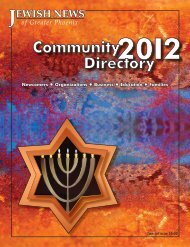downloadable PDF - Jewish News of Greater Phoenix
downloadable PDF - Jewish News of Greater Phoenix
downloadable PDF - Jewish News of Greater Phoenix
Create successful ePaper yourself
Turn your PDF publications into a flip-book with our unique Google optimized e-Paper software.
�<br />
8<br />
lifecycle events/rituals<br />
The following narrative was prepared by Rabbi Bonnie Koppell on behalf <strong>of</strong> the Board <strong>of</strong> Rabbis <strong>of</strong> <strong>Greater</strong> <strong>Phoenix</strong>.<br />
<strong>Jewish</strong> <strong>News</strong> added selected resources as a reader service, without endorsement.<br />
Birth<br />
The birth <strong>of</strong> a child is a time for joyous celebration<br />
for the family and community. “A baby,”<br />
wrote Carl Sandburg,“is God’s opinion that the<br />
world should go on.” In contemporary American<br />
practice, children are <strong>of</strong>ten given a secular, English<br />
name, and, additionally, a Hebrew name. In<br />
<strong>Jewish</strong> families <strong>of</strong> European origin (Ashkenazic),<br />
a child usually is named after a deceased relative.<br />
Couples might choose the same name, a name<br />
with a similar meaning or a name that begins<br />
with the same initial letter as that <strong>of</strong> the deceased<br />
loved one. In families <strong>of</strong> Mediterranean origin<br />
(Sephardic), a child is usually named after a living<br />
relative the parents wish to honor.<br />
Brit Milah<br />
Circumcision<br />
The circumcision ceremony, or brit milah, takes<br />
place on the eighth day following the birth <strong>of</strong> a<br />
male child. (The first day is included in the calculation.)<br />
Brit means covenant; milah is word. Circumcision<br />
is a symbol <strong>of</strong> the covenant established by<br />
God with Abraham and has been continuously<br />
performed as a sign <strong>of</strong> that covenant for many<br />
thousands <strong>of</strong> years. It is a mitzvah, a religious<br />
obligation, for the parent. Most parents choose<br />
to delegate that responsibility to a mohel, a<br />
pr<strong>of</strong>essional who is trained in the medical and<br />
religious aspects <strong>of</strong> this ceremony. Brit milah is<br />
<strong>of</strong>ten referred to as “bris,” reflecting the Yiddish<br />
pronunciation.<br />
The bris consists <strong>of</strong> two parts: the circumcision<br />
itself and the announcement <strong>of</strong> the child’s Hebrew<br />
name. The presence <strong>of</strong> the prophet Elijah is invoked,<br />
and prayers are said that the boy will grow<br />
to a life <strong>of</strong> “Torah, sacred relationship and mitzvot.”<br />
Each listed physician is ritually trained as a<br />
mohel.<br />
Paul M. Block, M.D., FACS<br />
Canyon State Urology<br />
5750 W. Thunderbird Road, Suite B200<br />
Glendale, AZ 85306; 602-375-1700<br />
pblock@canyonstateurology.com<br />
Richard Dobrusin, D.O.<br />
480-443-1464<br />
rdobrusin@gmail.com<br />
www.phoenixbris.com<br />
Steven Hauben, M.D.<br />
Scottsdale, AZ; 602-826-4131<br />
kididoc@gmail.com<br />
Lifecycle Events<br />
Robert S. Lipson, M.D.<br />
Scottsdale Urologic Surgeons<br />
7301 E. Second St., Suite 308<br />
Scottsdale, AZ 85251; 480-949-1212<br />
www.scottsdaleurology.com<br />
Alan B. Singer, M.D.<br />
Pediatrician<br />
602-705-3501<br />
dralansinger@cox.net<br />
The rabbis listed below are ritually trained as<br />
mohelim.<br />
Rabbi Mendy Lipskier<br />
Member <strong>of</strong> the International Bris Association<br />
16954 E. Kingstree Blvd.<br />
Fountain Hills, AZ 85268; 480-776-4763<br />
mohel@azbris.com<br />
www.azbris.com<br />
Rabbi Yossie Semel<br />
6804 N. 13th Place<br />
<strong>Phoenix</strong>, AZ 85014; 602-326-3885<br />
ybsemel@gmail.com<br />
www.azmohel.com<br />
Simchat Bat<br />
Ceremony on the birth <strong>of</strong> a girl<br />
Traditionally, the name <strong>of</strong> a female child is announced<br />
in synagogue on the Sabbath following<br />
her birth, including prayers for the recovery <strong>of</strong><br />
her mother. It has become the custom to hold<br />
an expanded ceremony to welcome the birth <strong>of</strong><br />
a girl and to announce her Hebrew name. This<br />
ceremony might be part <strong>of</strong> the Torah service or<br />
it might be held in the home <strong>of</strong> the family. The<br />
timing <strong>of</strong> this event as well as the liturgy is more<br />
fluid than that <strong>of</strong> the bris for a boy. The rabbi will<br />
assist the family in creating a unique celebration<br />
to inspire the baby’s family and welcome their<br />
daughter to the family and community.<br />
Pidyon Ha-Ben<br />
Redemption <strong>of</strong> first-born<br />
The pidyon ha-ben, redemption <strong>of</strong> the first<br />
born, takes place on the 30th day after the birth<br />
<strong>of</strong> a son who is the first-born child <strong>of</strong> his mother.<br />
According to the Torah, all first borns are dedicated<br />
to the service <strong>of</strong> God, and the son must be<br />
redeemed from this commitment. The parents<br />
exchange five shekels, or five silver coins, with<br />
a Kohen, a descendant <strong>of</strong> the priestly tribe, in a<br />
symbolic ceremony. This money will be donated<br />
to tzedakah. In some communities, it is the practice<br />
that first-born children, male or female, are<br />
redeemed.<br />
Bar/Bat Mitzvah<br />
Bar is the Aramaic word for son, bat is Hebrew<br />
for daughter. At the age <strong>of</strong> 12 for a girl, or 13 for<br />
a boy, the child assumes religious responsibility<br />
for their own actions. In the non-Orthodox<br />
world, the bar or bat mitzvah, son/daughter <strong>of</strong><br />
the commandments, will be called to the Torah to<br />
recite blessings and will read from the sacred text,<br />
as s/he leads the congregation in worship. In the<br />
Orthodox community, the girl will give a learned<br />
discourse reflecting on themes <strong>of</strong> the weekly<br />
Torah portion. In many congregations, bar/bat<br />
mitzvah both take place at age 13.<br />
Bar/bat mitzvah is a reminder to parents that<br />
their children are growing up and moving toward<br />
independence. The young person is reminded<br />
that they are becoming responsible to take the<br />
lessons they have learned from their family and<br />
from their religious education and use them to<br />
make good choices and to be positive influences<br />
in the world.<br />
It is not required to have a ceremony in order<br />
to become a bar or bat mitzvah, and one assumes<br />
the same rights and responsibilities <strong>of</strong> <strong>Jewish</strong><br />
adulthood regardless <strong>of</strong> whether or not an event<br />
is held. Typically, this is a meaningful time for family<br />
and friends to gather in the synagogue, usually<br />
on a Saturday but occasionally on another day<br />
when Torah is read. Often, the bar/bat mitzvah is<br />
accompanied by a celebratory meal.<br />
Many adults who did not have the opportunity<br />
to celebrate bar/bat mitzvah in their youth<br />
choose to participate in the adult bnai mitzvah<br />
programs <strong>of</strong>fered at synagogues throughout the<br />
Valley.<br />
Confirmation<br />
<strong>Jewish</strong> education is a lifelong process; it does<br />
not end with bar/bat mitzvah. Young people are<br />
encouraged to continue their commitment to<br />
<strong>Jewish</strong> learning through a program culminating<br />
in a confirmation ceremony, typically held at the<br />
conclusion <strong>of</strong> 10th or 11th grade. This ceremony<br />
will <strong>of</strong>ten be structured by the students themselves<br />
and <strong>of</strong>fers an opportunity to “confirm”<br />
their ongoing role in <strong>Jewish</strong> life. It may take place<br />
at the holiday <strong>of</strong> Shavuot and is most common in<br />
non-Orthodox congregations.<br />
Conversion<br />
Judaism accepts the validity <strong>of</strong> many spiritual<br />
paths and has typically not sought out converts<br />
from other religious traditions. It has been customary<br />
for many years to discourage conversion,<br />
in consonance with our belief that “the righteous<br />
<strong>of</strong> all faiths have a share in the world to come.”<br />
We are, however, open to those who join our<br />
<strong>Jewish</strong> <strong>News</strong> <strong>of</strong> <strong>Greater</strong> <strong>Phoenix</strong>



